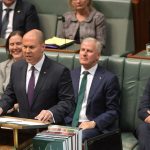We need another revolution in the march to good health

The last century saw an unprecedented improvement in human health. We started the twentieth century expecting a life of 50 years and ended it at 80.
Every three years, life expectancy increased by one. A complex set of factors has contributed to this – better nutrition, better environmental sanitation, better public health and medical discoveries. Given the remarkable medical discoveries that capture our headlines every week, one might think these gains will continue.
Not so.
For two years in a row the life expectancy in the US has moved backwards. Despite spending nearly A$13,000 per capita and positioning itself as the unrivalled leader in biomedical research – life expectancy is shrinking.
It seems that the advances of the last century are being swept back by the consequences of the likes of obesity, diabetes, suicide and drug overdose.
While Australia hasn’t seen a decline yet, its rate of improvement is also slowing with diabetes and obesity trending like America. And this temporary stall is just a reminder of the bigger challenges ahead: the ageing society, the increasing diabetes epidemic and the exponential complexity of multiple conditions in the frail elderly.
The effect of ageing on human health is a given – arteries thicken, valves stiffen, bones get thinner and joints become brittle. The average 50-year-old is usually free of chronic conditions, the 60-year-old has one, and the 85-year-old has three or four.
As the number of those in their seventies doubles and those in their eighties triple in the next three decades, our healthcare system is about to see an exponential increase in demand that it has never experienced before.
This assumes that the 80-year-old of tomorrow will be as healthy as the 80-year-old of today. That may not be the case.
When the current octogenarians were in their fifties only one in 10 had obesity or diabetes, but today nearly one in three does. This burden will show up in the future as increased strokes, heart attacks, renal failure, weakening limbs and failing sight. Modern medicine helps manage these illnesses but doesn’t cure most of these.
And that adds to the multiplier effect of having more than one disease – especially as one gets socially isolated and cognitively compromised. Managing any chronic disease in terms of doctors’ visits, diagnostic tests, medication schedules, side-effects and cost is difficult.

But as one tries to juggle multiple chronic illnesses simultaneously, side-effects and interactions multiply, unintended side effects exponentiate and the overall cost and complexity rises many times over.
So, what is to be done?
Biomedical discoveries will certainly provide new medications and interventions, but this is unlikely to be at the scale to counter the coming challenge.
Our biggest hope to manage this challenge is data, and transportation provides an encouraging example.
Companies like Uber have led to a greater than 50 per cent increase in the efficiency of use of the current roads and vehicles while giving individuals greater control – all through better use of data. I am not vouching for their employment practices, but their ability to use data to drive efficiency from currently available resources is exemplary.
However, healthcare is largely delivered as care of ‘one episode’ at a time, organised and curated in the head of the physician. It would be like Uber running its headquarters with hundreds of telephone operators flipping through road guides.
Instead, Uber uses computerised data to develop deep knowledge about the journeys and trajectories of an individual passenger and driver, then adds to that the current road closures and traffic congestion to deliver more efficiency.
The introduction of electronic medical records and national systems like the Australian Digital Health Authority, as well as confidential and safe systems for linking them provides a real opportunity for the future of health.

But, health is not a road journey, and you are not a passive passenger.
If we are to meet the coming challenge of health with data, three things are critical – a social consensus, individual autonomy and incrementally demonstrated utility.
Issues of data and health can easily be politicised. Fears about leaked data or compromised confidentiality are real – but can often be overblown.
If issues of ‘health data’ became swing issues in every political campaign, we will never realise their true utility. We need a broader social consensus about the centrality of data as a cornerstone of better health in the future and the limits of where it can be used and where not.
Any political debate should be about how, not whether data is central to healthcare.
In the early stages, it would be impossible to convince everyone. To respect the fears of the few, and allow the system to progress, any solution must accept the ownership of the data by the individual, and there must be opt outs where feasible.
Over the last thirty years as banks moved to ATMs and then to apps, similar fears were expressed. But, the sheer convenience and efficiency of the new solutions carried the day, and in so doing security was improved in ways unimaginable at the beginning. Nothing wins an argument like success. It will be the responsibility of the proponents of data for health to demonstrate with convincing examples.
Healthcare in Western nations stand at a tipping point. Just more of yesterday’s solutions will not be enough. Whether we will use data to effectively improve health, or just muddle in it, the next decade will tell.
This post was published by Pursuit.
Shitij Kapur is the Dean of the Faculty of Medicine Dentistry and Health Sciences and Assistant Vice-Chancellor (Health) of the University of Melbourne. His research has made major contributions to the understanding of psychosis and antipsychotic treatment.













